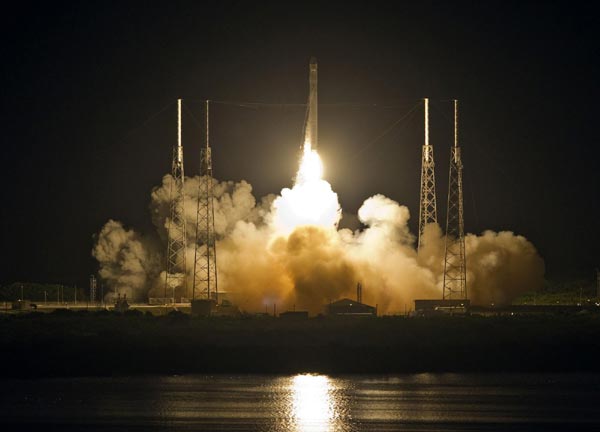 |
|
The SpaceX Falcon 9 test rocket lifts off from Space Launch Complex 40 at the Cape Canaveral Air Force Station in Cape Canaveral, Florida, May 22, 2012. The unmanned rocket owned by privately held Space Exploration Technologies blasted off from Cape Canaveral on Tuesday for a mission designed to be the first commercial flight to the International Space Station. The 178-foot (54-meter) tall Falcon 9 rocket lifted off at 3:44 am (0744 GMT) from a refurbished launch pad just south of where NASA launched its now-retired space shuttles. [Photo/Agencies] |
CAPE CANAVERAL - An unmanned rocket owned by privately held Space Exploration Technologies blasted off from Cape Canaveral Air Force Station on Tuesday for a mission designed to be the first commercial flight to the International Space Station.
The 178-foot (54-meter) tall Falcon 9 rocket lifted off at 3:44 am (0744 GMT) from a refurbished launch pad just south of where NASA launched its now-retired space shuttles.
Less than 10 minutes later, the rocket delivered its cargo -- a Dragon capsule with 1,200 pounds (544 kg) of supplies for the station crew - into orbit.
"Feels like a giant weight just came off my back," company founder and chief executive Elon Musk posted on Twitter after Dragon deployed its solar panels, the first of several key milestones that must be met before the spacecraft is cleared to dock at the station.
"Falcon flew perfectly!!" Musk wrote.
NASA is counting on companies like Space Exploration Technologies, or SpaceX, to take over the task of flying cargo - and eventually astronauts - to the $100 billion space station, which orbits about 240 miles (390 km) above Earth.
Currently, NASA is dependent on Russia to fly crew to the station, at a cost of more than $60 million per person. Russia, Europe and Japan also fly cargo to the station.
If its test flight is successful, SpaceX would become the first private company to reach the space station, a microgravity research complex for biological, materials, fluid physics and other science experiments and technology demonstrations.
SpaceX and a second company, Orbital Sciences Corp, already hold contracts worth a combined $3.5 billion to fly cargo to the station.
SpaceX also is among four firms vying to build space taxis to fly astronauts, tourists and non-NASA researchers.
Separately, NASA contributed nearly $400 million to SpaceX's $1.2 billion commercial space program, which includes development and up to three test flights of Falcon 9 rockets and Dragon capsules.
An analysis by the US Government Accountability Office shows that a similar program under traditional NASA procurement would have cost four to 10 times as much, said NASA's Alan Lindenmoyer, who manages the agency's commercial spaceflight initiatives.
Tuesday's launch followed a last-second cutoff of Falcon's planned liftoff on Saturday. Engineers later traced the problem to climbing pressure in an engine chamber due to a faulty purge valve.
"It looks like we probably could have flown with the condition," SpaceX president Gwynne Shotwell said during pre-launch mission commentary broadcast on NASA Television. "Once we separated from the ground, things would have settled down a bit, but it was still the right thing to do."
Dragon will take about a day to reach the space station's orbit. It will then spend another day practicing maneuvers and testing its communications systems and navigation aids. If all goes as planned, NASA is expected to clear Dragon for berthing at the space station on Friday.???